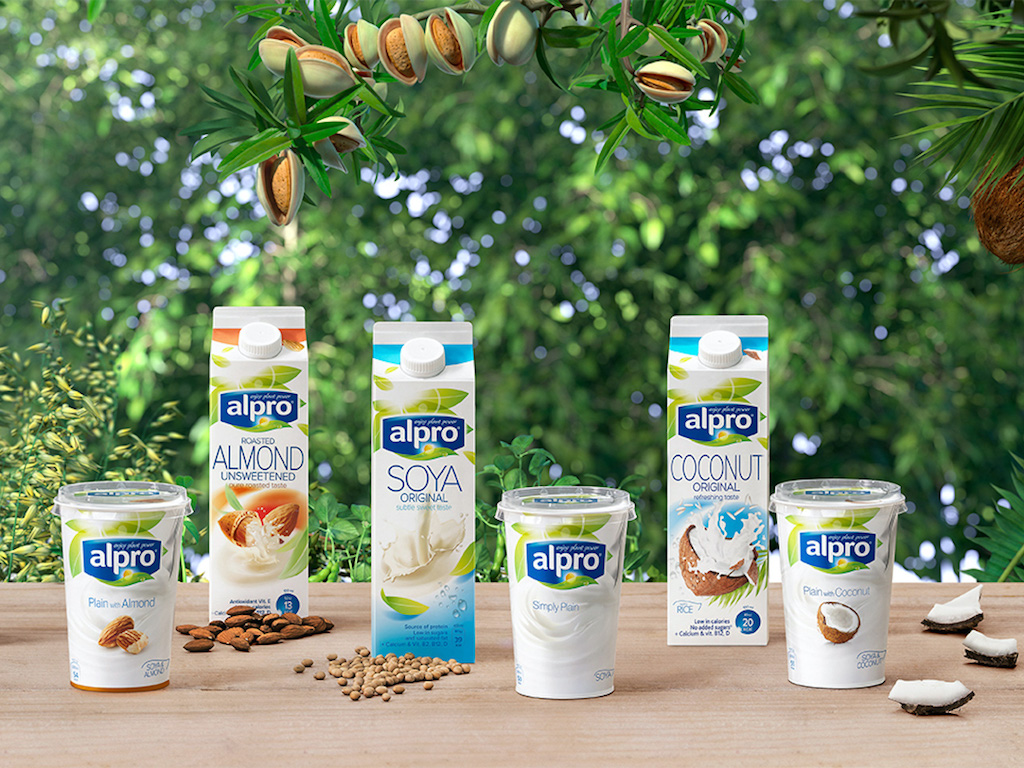3 Mins Read
Alpro has recently reinforced its commitment to sustainability with a slew of new goals, including climate ambitions to reach “zero carbon, zero water and zero waste” as well as health-focused pledges to promote the dietary shift towards plant-based eating by 2025. Food brands across the board have been launching environmental campaigns as consumers begin to couple their dietary choices with the impact it leaves on the planet.
Announced on the 40th anniversary of the brand’s inception, Alpro has set a number of new goals under its pledge dubbed “Feeding our Future with Plants”. The commitments made are centred around two topics, health and the planet, with the overall aim of the campaign to drive a “measurable dietary shift” towards plant-based eating by 2025 and work towards net-zero carbon operations.
Among some of the concrete policies that Alpro will implement include closing the loop on packaging by introducing 100% recyclable packs and paper-based cups for its yoghurt products and reducing its water footprint per product by 60% with a new water treatment installation planned in its Wevelgem factory next year.
The diets we have adopted are no longer sustainable for the planet, so we have to change the way we look at food production and consumption. Millions of people are more aware of the personal and environmental benefits of plant-based foods and drinks. Our brand has a mission to promote more flexitarian diets. We want to keep bringing more choice, variety and taste, and that’s why innovation lies at the heart of what we do at Alpro.
Sue Garfitt, General Manager at Alpro
On the health side, the Danone-owned brand will bring more diverse plant-based ingredients into its portfolio and increase the fibre content of its products to 50%. It plans to also roll out front of pack nutrition labels that provide easy-to-read information for consumers to each and every one of its products.
“The diets we have adopted are no longer sustainable for the planet, so we have to change the way we look at food production and consumption”, said Sue Garfitt, general manager at Alpro.
“Millions of people are more aware of the personal and environmental benefits of plant-based foods and drinks. Our brand has a mission to promote more flexitarian diets. We want to keep bringing more choice, variety and taste, and that’s why innovation lies at the heart of what we do at Alpro.”
Alpro’s moves come after its parent company Danone announced the creation of a new Plant-Based Acceleration Unit to meet its ambitions to double its plant-based sales globally from just over US$2.1 billion in 2019 to US$5.4 billion by 2025, a key indication of the strong demand for plant-based foods in the mainstream market.
In a statement, the CEO of Danone, Emmanuel Faber, explained that the new campaign under Alpro will align the brand with Europe’s recent push to transform into a more sustainable food system under the Farm to Fork strategy. “I am very encouraged that policy-makers are beginning to recognize the importance and urgency of evolving the food system towards a more sustainable path, working with nature instead of against nature,” Faber said in a statement.
The trend towards healthy and sustainable products is becoming unstoppable and the role food companies play in supporting flexitarian diets that are good for the planet and good for the health.
Emmanuel Faber, CEO of Danone
“This initiative encourages consumers to adopt healthier and more sustainable eating habits, including more plant-based foods and drinks as part of the planetary diets scientific experts are calling for. It shows how the trend towards healthy and sustainable products is becoming unstoppable and the role food companies play in supporting flexitarian diets that are good for the planet and good for the health.”
In recent months, a number of food brands have doubled down on their commitments to sustainability. Upfield, the parent company of multiple plant-based spreads and butters including Flora and Becel, recently said that it will carbon label 100 million products by the end of next year in a bid to raise awareness of the carbon footprint of foods.
Meanwhile, Eat JUST, the famous makers of the plant-based JUST Egg, reaffirmed its sustainability mission in a recent report with new goals to source all its ingredients only from sources that are in current agricultural production, which will help reduce the demand for unsustainable farming practices, deforestation and biodiversity loss.
Lead image courtesy of Alpro.




